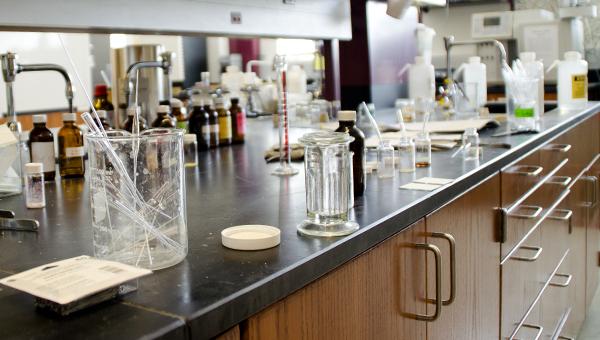Walking among the cubicles and desks in Rodgers Library, hushed murmurs of the foreign-sounding “organic” and “o-chem” are not a rarity. For many students, organic chemistry has a reputation for being one of The University of Alabama’s most challenging courses.
Max Mittenthal, a junior majoring in chemical engineering, said he had to completely change his style of learning and studying for the class.
“Organic’s a lot different than other subjects,” Mittenthal said. “I had to stop trying to memorize how problems worked and instead figure out how chemistry worked.”
According to the website Rate My Professors, which allows students to rate professors and classes based on overall quality, helpfulness and easiness, the chemistry professors at the University have earned an overall average score of 3.87 out of 5. The average score for overall quality of five organic chemistry professors is four out of five, while their average helpfulness is 4.02 and the average easiness of their courses is 2.28.
Courtney Rentas, a junior majoring in biology and psychology, completed both parts of organic chemistry last year, and said she doesn’t think organic is necessarily harder than general chemistry but requires a different approach.
“Some students really excel at organic despite struggling with general chemistry,” she said. “It depends a lot on what learning style you have and how much you prepare.”
Kevin Shaughnessy, an organic chemistry professor who serves as the chair of the chemistry department, said the organic thought process can be difficult for students to grasp because of the science’s similarity to solving a logic problem: It is better to find out the “how” rather than the “what” when it comes to the subject.
“The ones who [do well] try to understand why things are the way they are,” he said. “They have much more success than the ones who try to memorize facts, because they’re hard to tie together.”
Like most science courses, organic chemistry includes a lab. Aymara Albury, a recent graduate who served as a graduate lab teaching assistant, said the culture of organic labs takes getting used to for most students.
“These are all independent labs, and one must write-up their own version of the procedure because students cannot use their lab textbooks while performing their lab experiments,” she said.
Organic chemistry labs require full lab reports following each experiment with carbon copies of hand written lab notes attached as proof of authenticity, as well as a 50-minute post-lab lecture and quiz. Albury said although the standards are high for an organic lab, the expectations aren’t without purpose.
“It may seem like a lot is being asked of the students, but it is a realistic request when you consider the professions they desire to pursue,” she said. “Whether they want to be doctors, scientists or any other career, it will teach the importance of preparation, documentation and decision making.”
Rentas said the dedication to prep work was a huge factor in earning high marks in the class and the lab. She made a B in her first semester of organic chemistry, but made an A in her second semester after studying hourly every night of the week and over the weekend.
Mittenthal, who received As in both his organic classes and labs, said the path to success wasn’t easy. He said he felt like the temptation to cut corners was the downfall of his less-than-successful classmates who dropped the class.
“You really can’t take shortcuts. You have to read all of the book and do all of the practice problems,” he said. “After the first exam, I’d say about one-fifth of the class dropped because they just had too much on their plates.”
Dropping organic chemistry isn’t something many want to publicize, mainly due to the competitiveness of the post-graduation the job market and medical school applications. A “W,” or withdrawal, on a transcript is not always considered a red flag to a post-graduate program or job application of a student’s commitment or work ethic.
“Typically, students that retake the class are a little more prepared and motivated the following semester because they are aware of what to expect from their previous enrollment in the class,” Albury said.
Shaughnessy said the official number of W’s he gives out each semester hovers around 20 percent, typically occurring after the first two tests. Shaughnessy said he doesn’t encourage students to drop the course even if they do poorly on their first tests.
“I always tell my students to first talk to their professors,” he said. “It’s very difficult to do, but in some cases people can dig themselves out if they work [hard enough].”









